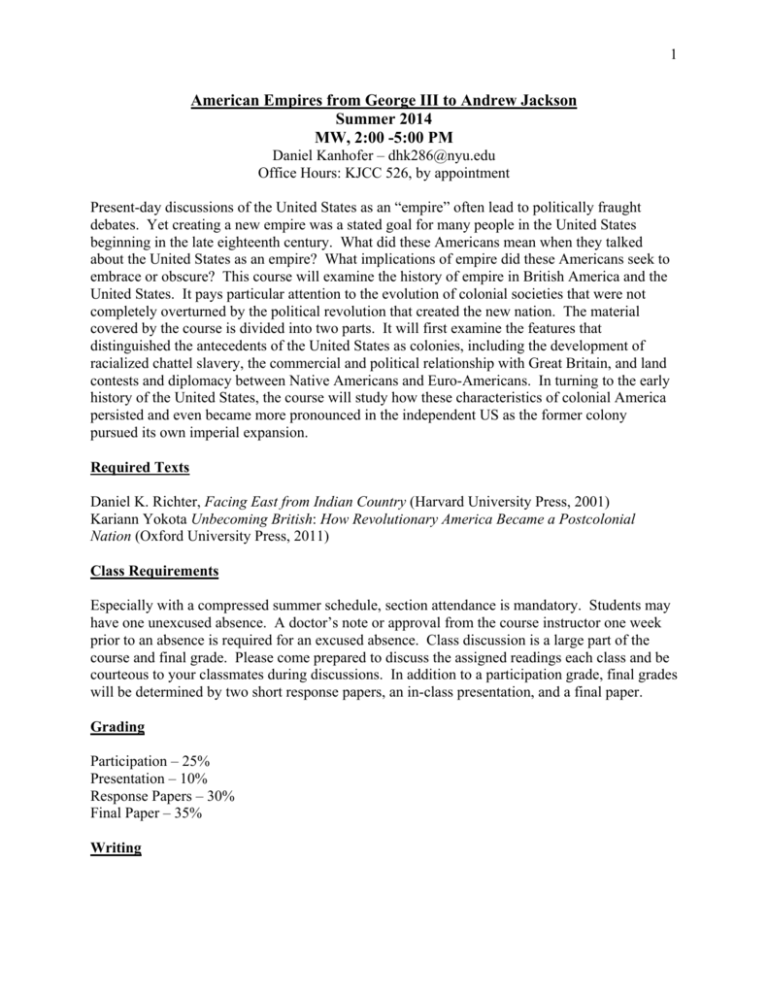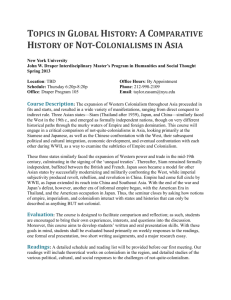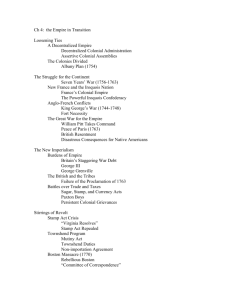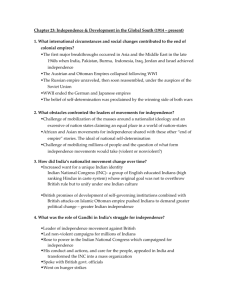American Empires from George III to Andrew Jackson Summer 2014
advertisement

1 American Empires from George III to Andrew Jackson Summer 2014 MW, 2:00 -5:00 PM Daniel Kanhofer – dhk286@nyu.edu Office Hours: KJCC 526, by appointment Present-day discussions of the United States as an “empire” often lead to politically fraught debates. Yet creating a new empire was a stated goal for many people in the United States beginning in the late eighteenth century. What did these Americans mean when they talked about the United States as an empire? What implications of empire did these Americans seek to embrace or obscure? This course will examine the history of empire in British America and the United States. It pays particular attention to the evolution of colonial societies that were not completely overturned by the political revolution that created the new nation. The material covered by the course is divided into two parts. It will first examine the features that distinguished the antecedents of the United States as colonies, including the development of racialized chattel slavery, the commercial and political relationship with Great Britain, and land contests and diplomacy between Native Americans and Euro-Americans. In turning to the early history of the United States, the course will study how these characteristics of colonial America persisted and even became more pronounced in the independent US as the former colony pursued its own imperial expansion. Required Texts Daniel K. Richter, Facing East from Indian Country (Harvard University Press, 2001) Kariann Yokota Unbecoming British: How Revolutionary America Became a Postcolonial Nation (Oxford University Press, 2011) Class Requirements Especially with a compressed summer schedule, section attendance is mandatory. Students may have one unexcused absence. A doctor’s note or approval from the course instructor one week prior to an absence is required for an excused absence. Class discussion is a large part of the course and final grade. Please come prepared to discuss the assigned readings each class and be courteous to your classmates during discussions. In addition to a participation grade, final grades will be determined by two short response papers, an in-class presentation, and a final paper. Grading Participation – 25% Presentation – 10% Response Papers – 30% Final Paper – 35% Writing 2 Papers should be double-spaced and typed in 12-point font with one inch margins. Students will write two response papers in the weeks of your choosing that compare and contrast two class readings. These papers should be 3 to 4 pages long. Two final paper prompts will be distributed to choose from that will ask you to make an argument about a major theme of the class, drawing on lectures and at least three course readings. These papers should be 6 to 8 pages long. More instruction and tips about writing will be provided in class. Week 1 July 7 - Empires in the Atlantic World Readings: Jane Burbank and Frederick Cooper, Empires in World History: Power and the Politics of Difference (Princeton University Press, 2010), 1-22; Anthony Pagden, Lords of All the World: Ideologies of Empire in Spain, Britain, and France c.1500-c.1800 (Yale University Press, 1995), TBD. July 9 - Imperial Subjects? Readings: Daniel K. Richter, Facing East from Indian Country (Harvard University Press, 2001), 1-10, 69109; Jenny Hale Pulsipher, “Subjects... Unto the Same King": New England Indians and the Use of Royal Political Power,” Massachusetts Historical Review, vol. 5 (2003): 29-57; Nancy Shoemaker, “How Indians Got to be Red,” The American Historical Review, vol. 102, no. 3 (Jun., 1997): 625-644. Week 2 July 14 - Colonial Slave Society Readings: Kathleen M. Brown, “Nathaniel Bacon and the Dilemma of Colonial Masculinity” in Gender and the Southern Body Politic, Nancy Bercaw, ed. (University Press of Mississippi, 2000), 2962; Edmund S. Morgan, “Slavery and Freedom: The American Paradox,” The Journal of American History, vol. 59, no. 1 (Jun., 1972): 5-29 July 16 - The British Imperial Constitution Daniel Hulsebosch, “Imperia in Imperio: The Multiple Constitutions of Empire in New York, 1750-1777,” Law and History Review, vol. 16, no. 3 (1998): 319-79; Richter, Facing East from Indian Country, 151-188. Week 3 July 21 - The Empire of Goods Assigned Reading T. H. Breen, “‘Baubles of Britain’: The American and Consumer Revolutions of the Eighteenth Century,” Past & Present, No. 119 (May, 1988): 73-104; Richter, Facing East from Indian Country, 41-68; Timothy J. Shannon, “Dressing for Success on the Mohawk Frontier: Hendrick, William Johnson, and the Indian Fashion,” The William and Mary Quarterly 53, no. 1 (1996): 13-42. July 23 - Revolution for Empire? 3 Readings: Richter, Facing East from Indian Country, 189-253; Staughton Lynd and David Waldstreicher, “Free Trade, Sovereignty, and Slavery: Toward an Economic Interpretation of American Independence,” William and Mary Quarterly 68, no. 4 (October 2011): 597-630. Week 4 July 28 - The US Imperial Constitution Readings: Daniel Hulsebosch, “The Imperial Federalist: Ratification and the Creation of Constitutional Law” in Constituting Empire: New York and the Transformation of Constitutionalism in the Atlantic World, 1664-1830 (University of North Carolina Press, 2005), 203-58. July 30 - Declarations of American Dependence Readings: Kariann Yokota Unbecoming British: How Revolutionary America Became a Postcolonial Nation (Oxford University Press, 2011), 1-114; Michael Warner, “What's Colonial About Colonial America?” in Possible Pasts: Becoming Colonial in Early America, Robert Blair St. George, ed. (Cornell University Press, 2000), 49-70. Week 5 August 4 - Demarcating Race and Extending Slavery Final paper prompt distributed Readings: Yokota, Unbecoming British, 192-242; Adam Rothman, Slave Country: American Expansion and the Origins of the Deep South (Harvard University Press, 2005), [TBD]. August 6 - Empire without Subjects Readings: Nicole Eustace, “Demographic Strategies and the Defeat of Tecumseh” in 1812: War and the Passions of Patriotism (University of Pennsylvania Press, 2012), 118-67; D.W Meinig, “Empire: The Geopolitical Management of Captive Peoples” in The Shaping of America: Continental America (Yale University Press, 1993), 170-96. Week 6 August 11 - Towards Manifest Destiny Readings: Thomas R. Hietala, “American Exceptionalism, American Empire” in Manifest Design: Anxious Aggrandizement in Late Jacksonian America (Cornell University Press, 1985), 173-214; Peter S. Onuf, “American Exceptionalism and National Identity,” American Political Thought, vol. 1, no. 1 (Spring 2012): 77-100. August 13 - [Last Class] TBD Final papers due








